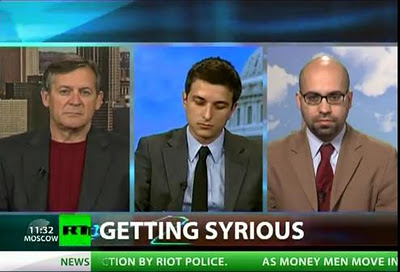UPDATES
Russia is trying to convince us that there is nothing going wrong in Syria
February 15, 2012 | Daniel Meyerowitz-Katz

As the bloodshed continues in Syria, with no end in sight, there are increasing calls for something to be done. Joining the chorus today were both Angelina Jolie and Grand Imam Ahmed el-Tayeb, the head of Cairo’s al-Azhar University, one of the most prestigious theological institutions in the Islamic world. As Reuters reported, Tayeb used strong language, deploring condemnations without action and seemingly calling for some form of intervention from the Arab League.
“The situation now, brothers, no longer needs statements to condemn and criticise, but it is in desperate need of urgent, serious, and bold action from the Arabs,” Tayeb added, without giving details of what kind of action he sought.
“I call on the human conscience to stop this hellish killing machine that works to shed blood. It must be stopped.”
While these calls to end the Syrian crackdown become increasingly urgent even amongst the Arab leaders, who are traditionally hesitant to criticise each other, one country that is not joining in the condemnations at all is Russia. Not only did Russia veto the recent UN Security Council resolution condemning Syria’s Assad regime, it seems that Russia has been actively supporting the Syrian rulers through its English-language news service Russia Today (RT). Writing in Tablet, Michael C. Moynihan has given an in-depth look into RT’s clearly pro-Assad agenda.
Anyone who has watched Russia’s English-language propaganda channel RT over the past 10 months would have learned that in Syria, foreign-funded terrorists, Israeli operatives, and American intelligence agents are attempting to destabilize a benevolent, popular autocrat. Take, for example, the ongoing siege of Homs, in which more than 400 people have been slaughtered by Bashar al-Assad’s regime over the past week and a half. Rockets and mortar have rained down on apartment buildings, and, according to a report from the Syrian Observatory for Human Rights, entire families have been executed inside their homes. Here’s how RT summed up news of the massacre: “Disinformation makes it difficult to establish Homs reality.”
The tragedy, as Moynihan notes, is that RT is seen by many on the Western left as a more reliable source of news than the Western “corporate media”. As in the case of Qatar’s state-owned Al-Jazeera network, RT has managed to dupe well-meaning Westerners into believing what amounts to state propaganda:
In the aftermath of the Iraq War, the act of “questioning” established media narratives was often judged to be a brave act of patriotism. It is widely held that the mainstream media was, in some sense, culpable for the war: It wasn’t the residual shock of 9/11 or a sense that America had unfinished business in Baghdad that motivated American support for the removal of Saddam Hussein, but the New York Times’ erroneous reporting on weapons of mass destruction and the media’s support of the Bush Administration. It was out of this media milieu that RT-and its advertising campaign, admonishing news consumers to “question more”-was born.
RT’s online defenders argue that the network offers an alterative to “Western” news coverage, rather than simply a pro-Kremlin perspective. Which is why, despite receiving funding and editorial cues from a government intolerant of dissent and credibly accused of election fraud, RT’s anti-Western narrative convinces radicals on the right and left and contrarians that it’s the news alternative for those who distrust state power.
Even with these incredulous denials of any wrongdoing on Syria’s behalf, there may yet be a chance that Russia will abandon Assad. Paul Koring has given a run-down of the Russian connection to Syria in Canada’s Globe and Mail, noting that it is not Assad, but the alliance with Syria, that Vladimir Putin is concerned with.
Just as the United States was willing to jettison Egyptian president Hosni Mubarak, a loyal friend and reliable ally for decades, when it suddenly suited American interests, so Russia’s steadfast support of Mr. al-Assad may quickly erode … The Egyptian drama is still unfolding. But for now at least, the Obama administration has succeeded in safeguarding U.S. interests and retaining Egypt as an ally even as it dumped Mr. Mubarak
Russia has similar leverage. For generations, Syrian fighter pilots have flown MiG warplanes, armoured-corps commanders have fought in Russian tanks and most of the senior military – including Hafez al-Assad, the current president’s father who seized power in 1971 – honed their skills alongside Russians.
… It is not yet clear that Moscow has decided that Mr. al-Assad must go. Unlike the very public calls made by Mr. Obama that doomed Mr. Mubarak, any Russian-orchestrated exit for the Syrian dictator would likely be more clandestine.
Russia’s continued support is surely contributing heavily to Assad’s continued hold on power. If Putin were to abandon Assad, while it would not necessarily assure his downfall, it would certainly strike a major blow to the Syrian dictator. Hopefully, Putin will be convinced that his interests do not lie in trying to convince the world that Assad is a wonderful man, but rather in helping to rid Syria of his malign rule.
Daniel Meyerowitz-Katz
Tags: Russia





